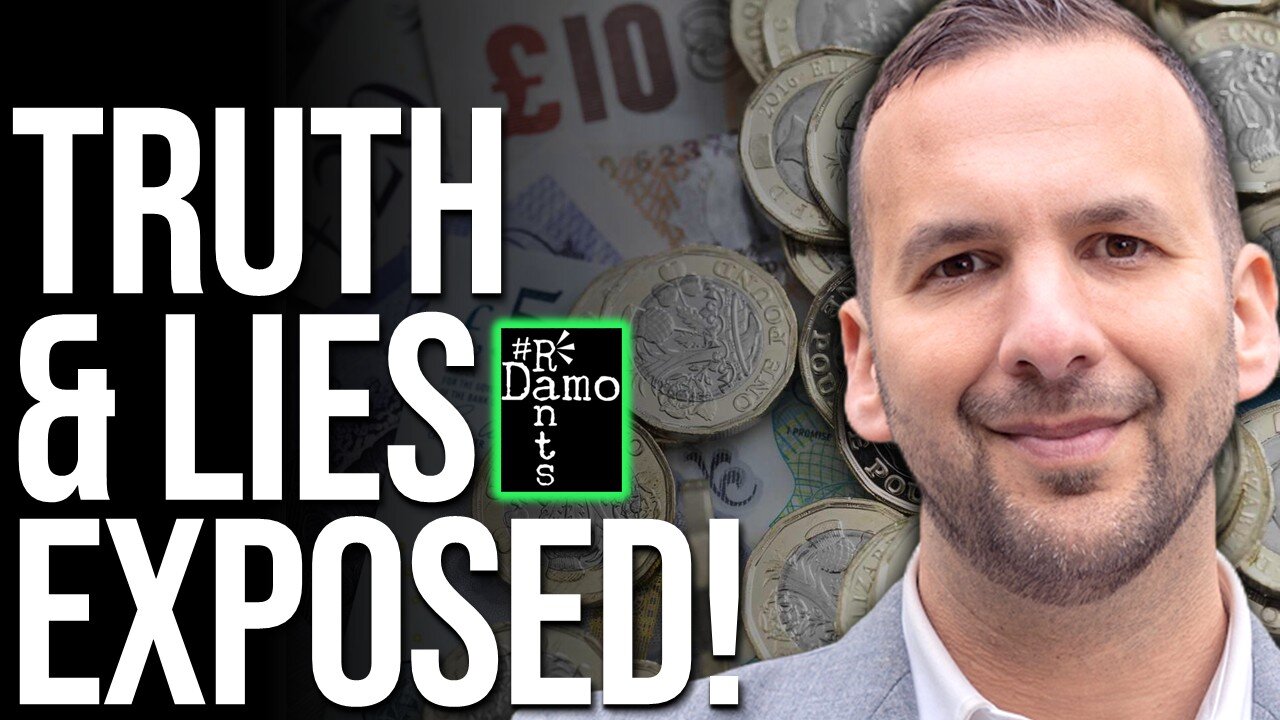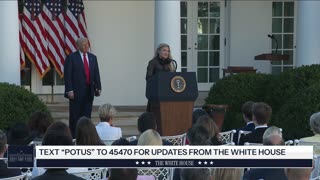Premium Only Content

Britain’s Rich Tried to Hide £20 Billion — The Green Party Just Found It
Right, so most party conferences promise change and deliver what might charitably be called choreography. The Greens did the opposite. In Bournemouth, they didn’t just talk about “bold ideas” — they passed them and for Labour members they might be even more shocked to hear that their leadership accepted that too. A wealth tax on the top one percent. A plan to end the Bank of England’s £20 billion annual gift to commercial banks. A programme to phase out landlordism altogether. And a motion to label the Israeli Defence Forces what international law already suggests they are — a terrorist organisation. It was the most radical policy slate in British politics in years, and the mainstream press barely knew what to do with it. Because this wasn’t performance; it was real substance. While Labour polished its optics and the Tories rehearse denial ahead of their upcoming conference, the Greens turned morality into policy. No wonder the media is still desperately trying to ignore them.
Right, so the Green Party conference in Bournemouth was the event Britain’s broadcasters decided not to notice.
Every other party leader during conference appears on Laura Kuenssberg’s Sunday programme don’t they? You can argue the value of that, but the invite is there. Zack Polanski, leading the Greens through the most substantial surge in their history, wasn’t and that speaks volumes. BBC bias strikes again and Kuenssberg frankly rarely needs help in that department does she?
It's risk management though. If mainstream editors sense a politician who can up-end the consensus, they minimise exposure and call it balance. Yet this silence compounds them given what has come out of conference and what they could have been talking about. While the talk shows recycled Labour, Reform and Conservative talking points, the Greens passed the most coherent set of moral and economic policies of the year and left Bournemouth as Britain’s a bigger political party.
Party officials announced 83,500 members in England and Wales. Add roughly 8,000 Scottish Greens and the total passes 91,000 — about 50 percent more than the Liberal Democrats’ paying membership, which hovers near 60,000 once the email-list “supporters” are removed. That fact alone, confirmed by conference reporting and financial filings, should have been headline news. Instead it circulated online, fuelling the very curiosity the blackout was meant to suppress.
The establishment tried to edit the Greens out of the national picture. It ended up proving the party’s central claim: that power in Britain is allergic to honesty.
Polanski opened conference with a statement that defined its moral centre: “Britain’s political class is poisoned by extreme wealth.”
He was not exaggerating either. The numbers underpinning the claim are public. The UK’s top 1 percent control nearly half of all financial wealth. The Greens’ proposal — a wealth tax on assets above £3.4 million — is backed by academic modelling showing it could raise tens of billions a year while touching fewer than 300,000 people. It’s not plumbers and hairdressers he’s coming for, but for those who earn more money in one nights sleep that you do in 10 years of toiling.
Then came the systemic challenge that startled the financial press: stop the Bank of England from paying £20 billion a year in interest to commercial banks on reserve balances. Why do banks deserve benefits? People on low incomes get attacked all the time, but the banks getting handouts never gets questioned. These payments, a post-2008 technical fix, have turned into a permanent transfer from the public purse to private finance. End them, Polanski argued, and you free resources for homes, energy transition, flood defence — actual public needs.
The Financial Times verified the figure; it didn’t contest the maths, only the morality. Economists branded the plan “unrealistic,” meaning it interfered with privilege. But realism that exists simply to protect corruption is just defeat with a spreadsheet isn’t it? Why should we admit defeat on that?
This is what Polanski means by poison. Britain’s governing parties call theft efficiency and obedience prudence. A wealth tax and an end to reserve-interest subsidies are not radical innovations; they are the start of a national detox. They ask the forbidden question: who is the economy for?
If the fiscal debate was the intellectual flashpoint, the housing motion was the emotional one. Delegates voted to “abolish landlords.” The headline sounds incendiary doesn’t it? The text was abundantly clear though: national rent controls, abolition of Right to Buy, ending buy-to-let mortgage incentives, a council right of first refusal on property sales, and a publicly owned housing manufacturer.
Critics screamed confiscation; but the numbers say otherwise. Private rents now consume about 40 percent of tenants’ income and drain £66 billion annually from households to landlords. Councils then pay inflated rents to re-house the homeless in the same properties. The market is no longer shelter; it’s an extraction machine, draining wages like a parasite, harming spending power, strangling the economy which requires us to spend in it.
The Greens’ proposal treats housing as infrastructure — the foundation of public life — not a speculative asset. Cities such as Vienna or Copenhagen prove it works. Britain’s version of “realism” has delivered record homelessness and derelict councils. Abolishing landlordism is not utopian; it’s the re-introduction of decency into economics. It restores our ability to own a home of our own. For those asking where will we live? Well the houses will still be there, its just you can own them, instead of someone else when you live there.
The conference’s most consequential decision concerned foreign policy. Delegates voted to urge the UK government to proscribe the Israeli Defence Forces as a terrorist organisation.
The legal argument is perfectly straightforward here: under British law, an organisation using violence against civilians for political ends meets the definition of terrorism. The IDF’s bombardments of Gaza’s residential areas, destruction of hospitals, and blockade-induced starvation meet that threshold. The motion condemned actions, not ethnicity or faith.
Because Polanski is Jewish, the accusation of antisemitism collapsed on contact with reality. He has said repeatedly that conflating Judaism with Israeli state policy is itself antisemitic. The vote was a statement of consistency: if international law means anything, it must apply to allies as well as enemies, though frankly with allies like Israel who needs enemies.
No other UK party would touch that subject. Labour fears its donors, the Conservatives fear exposure and further bleeding away to Reform, Reform are desperate to become Israel’s new favourites and the Liberal Democrats? Well what do they ever even stand for frankly. The Greens chose the harder path — truth over permission — and in doing so placed moral law above political convenience.
As delegates packed up though, real life outside conference intervened. A suspected arson attack struck a mosque in Peacehaven, East Sussex. An apparent hate crime but handled by the media much differently than the synagogue attack in Manchester.
As a result, Deputy Leader Mothin Ali responded to this incident within hours. On the Green Party’s website he demanded police “seek clarity on the motives of this attack and whether this hate crime constitutes an act of terrorism.” Then he left the conference and went to the scene, choosing to do that instead of delivering the closing speech. Priorities you see. Brighton & Hove Council issued its own condemnation, but it was Ali’s action — standing outside a burned mosque talking with worshippers — that defined the party’s character under this new leadership team.
The contrast with national media was stark though. The attack on a Manchester synagogue, rightly, received front-page coverage; the Peacehaven fire barely appeared though. The Greens refused the hierarchy of empathy. Polanski condemned antisemitism; Ali condemned Islamophobia; Rachel Millward the other Deputy Leader who gave an intense and rousing speech on equality, called both the same sickness. In a political culture addicted to selective compassion, that equality of conscience stood out.
In what media coverage Green Party conference got, “Zacktivism” is the shorthand that stuck. It isn’t a personality cult; it’s a model of pluralist leadership. A Jewish leader who condemns Israeli war crimes. A Muslim deputy who confronts domestic Islamophobia. A Christian co-leader who calls that solidarity the moral heart of their politics. Three traditions, one ethical message.
That unity gives the party resilience. Labour enforces conformity from the top down; Your Party struggles to find direction between its two apparent leaders right now. The Greens have something rarer: decentralised ethics with central purpose. They argue, but they don’t fracture, because their moral floor is non-negotiable — dignity for all, no exceptions. With that as the basis for everything, you can only build on that, not tear down.
The media blackout around the conference was deliberate and systemic. The BBC and print media work inside an ecosystem of access journalism that rewards predictability. The Greens threaten that bargain because they owe no donors and answer to no corporate advertisers. They are not part of that game, and so they are not invited to play.
But in the digital age their silence simply gives way to others. The BBC’s omission became the story itself. Social-media clips of Green speeches circulated, outperforming official coverage of larger parties. The attempt to starve them of oxygen failed. What was meant to marginalise them made them matter instead.
British political journalism no longer reports power; it manages it. When a party surpasses the Lib Dems in membership, proposes £20 billion in recoverable funds from banks, and redefines Britain’s foreign-policy debate yet still can’t even get a studio slot, the issue is not bias; it’s decay. And where is Ofcom?
Ending Bank of England reserve-interest payments would realign monetary policy with public purpose. Other central banks already use tiered systems that limit windfalls to commercial institutions. The idea’s resistance is political, not technical.
The same applies to the wealth tax. Research from the LSE’s Wealth Tax Commission estimates a 1 percent levy on net assets above £3 million could raise around £70 billion annually even after behavioural shifts. Critics call that “class war.” Well only against the class that consists of just 300,000 people. The Greens call it democracy. A society where billionaires use public infrastructure but buy private immunity has already waged war on the remaining 66 million people in this country.
Taxation, in this framing, is moral architecture. It defines who belongs. The Greens are rebuilding that architecture brick by brick. Britain isn’t broke; it’s being looted. Stopping the looting is not radical — it’s maintenance of civilisation.
Inside that conference hall the tone felt alien to modern politics: ordinary language, no consultants, no corporate sponsors. Delegates debated ideas rather than optics. It reminded older activists of conferences before politics was PR.
This matters because sincerity has become subversive. In a political culture that rewards cruelty, empathy is rebellion. The Greens understand that decency is a strategy. Compassion, translated into housing, taxation, and foreign policy, is governance. They are redefining realism as the ability to care without apology.
When critics dismiss them as naïve, they reveal their own cynicism. The choice Britain faces is not between idealism and pragmatism but between conscience and collapse.
The Greens’ internal structure is the quiet reason for their stability. Motions originate with members, are debated publicly, and bind leadership once passed. They don’t get a veto. They don’t get to arbitrarily ignore it like Keir Starmer’s Labour. That bottom-up discipline produces coherence. It also means moral consistency survives leadership change. It defines the Greens above all other parties.
Polanski understands the personal cost of that approach. He watched how the press destroyed Jeremy Corbyn with years of distortion and guilt-by-association. He knows the same playbook will be used against him — ignore first, vilify later — and he proceeds anyway. That persistence gives the movement credibility. Authenticity that survives attack becomes authority.
Because the leadership shares accountability, it doesn’t shift the blame like Keir Starmer always does, nothing is ever his fault is it? Smear campaigns therefore will always lose traction. You can target an individual; you can’t cancel a collective conscience.
Add up the conference resolutions and a pattern emerges: a comprehensive moral programme made policy. Economic justice through taxation, social justice through housing, global justice through law. For the first time since the 1970s, a UK party is offering an integrated worldview rather than a focus-group menu.
This is Britain’s chance for political recalibration. The Greens have shifted from just being a climate conscience to being the moral axis around which future politics may revolve. Their growth exposes the void at the centre of Labour’s triangulation and the moral bankruptcy of Reform populism.
Internationally, the implications are larger still. The IDF motion aligns Britain’s Greens with a global majority demanding that international law apply universally. It signals to allies and adversaries alike that Western complicity has limits. If that view gains traction across Europe’s Green and social movements, the diplomatic landscape changes: morality re-enters the room.
The data underpinning this shift is solid. Polls show majority support for higher wealth taxes, rent controls, and an immediate ceasefire in Gaza — positions now mainstream because the Greens normalised them. Membership growth mirrors that sentiment: it is generational as well as ideological. Voters under forty see the Greens not as protest but as sanity and many of us over 40 do as well.
But success brings danger. The moment a moral movement starts chasing establishment approval, it corrodes from the inside. The Greens’ task is to hold moral ground without hardening into self-righteousness. That requires vigilance and humility — the discipline to stay angry without becoming bitter.
If they fail, Britain returns to managed decline. If they succeed, they redraw the moral map of modern politics. The stakes are that big.
The structural barrier is electoral, not moral. Under proportional representation the Greens would already hold dozens of seats; under first-past-the-post they may win only a few. The challenge is to convert moral authority into pressure strong enough to force systemic reform because, as Polanski has himself stated, as much as everything else is important, reform to the system is the only way we’ll ever deliver it.
History shows it can happen. Every moral movement begins outside power: the abolitionists, the suffragettes, the civil-rights campaigners. They won not by permission but by persistence. The Greens are now operating in that lineage. Their strength lies in making neutrality impossible. When they confront housing injustice, silence becomes complicity. When they name Israeli crimes, denial becomes endorsement. That dynamic is what establishment media fear the most — the exposure of their hypocrisy through such comparisons.
The media’s “neutrality” is cracking. Each blackout accelerates curiosity. Each smear decays faster than the last. Suppression has entered its implosion phase.
The attempt to erase the Bournemouth conference from public consciousness achieved the opposite. Every fact the media ignored is now part of the record: 91,000 members, motions passed, statements made, acts of courage witnessed. What remains is interpretation, and that has flipped.
The BBC’s omission wasn’t an oversight; it was fear disguised as impartiality. And it failed. The Greens didn’t vanish; they multiplied. What was meant to silence them imploded, exposing the fragility of the gatekeepers who tried to contain them.
Polanski knows what comes next — the scrutiny, the caricatures, the lazy attempts to reframe moral conviction as extremism. He’s seen the script before, but this time the audience really ought to be wiser.
Bournemouth 2025 will be remembered not as a minor party’s gathering but as the moment Britain’s conscience re-entered politics. The media tried to mute it; but the country has heard it anyway. And that, in the end, is the story: they silenced the Greens — and amplified them instead.
For more on the incident in Peacehaven as well as the latest on the Manchester synagogue attack, please do check out this video recommendation here as your suggested next watch.
Please do also hit like, share and subscribe if you haven’t done so already so as to ensure you don’t miss out on all new daily content as well as spreading the word and helping to support the channel at the same time which is very much appreciated, holding power to account for ordinary working class people and I will hopefully catch you on the next vid. Cheers folks.
-
 1:31:12
1:31:12
Kim Iversen
2 hours agoMAYDAY! America’s Food System Is Collapsing — And Trump Thinks CHINA Will SAVE Us?
20.5K60 -
 LIVE
LIVE
StoneMountain64
6 hours agoBattlefield 6 Sniping and Unlocking SNIPERS from LONG RANGE
89 watching -
 LIVE
LIVE
GritsGG
58 minutes agoSolos! Most Wins in WORLD! 3734+!
74 watching -
 3:59:54
3:59:54
Right Side Broadcasting Network
6 hours agoLIVE REPLAY: President Trump Participates in the Charlie Kirk Medal of Freedom Ceremony - 10/14/25
117K34 -
 1:05:00
1:05:00
Dr. Drew
6 hours agoLetitia James Just Found Out "No One Is Above The Law" In Spectacular Display Of FAFO w/ Viva Frei – Ask Dr. Drew
43.1K20 -
 1:12:42
1:12:42
The White House
3 hours agoPresident Trump Participates in a Medal of Freedom Ceremony for Charlie Kirk
27.7K12 -
 1:42:10
1:42:10
Professor Nez
6 hours ago🚨🇺🇸Trump Awards Medal of Freedom to Charlie Kirk LIVE: President Trump Honors Charlie Kirk
29.6K20 -
 LIVE
LIVE
LFA TV
22 hours agoLIVE & BREAKING NEWS! | TUESDAY 10/14/25
822 watching -
 1:12:06
1:12:06
vivafrei
6 hours agoAre they Killing the Ostriches? Roger Ver Strikes a Deal! Tommy Robinson, Tom Homan & MORE!
124K47 -
 34:01
34:01
Stephen Gardner
22 hours ago🔥You won’t BELIEVE what just happened to Trump!
36.1K32